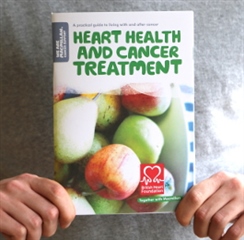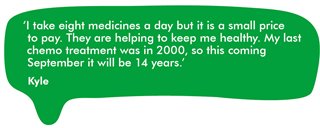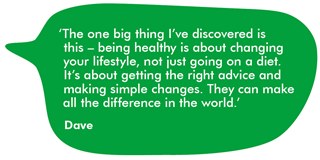In our latest blog, our Information Access volunteer Nis looks at ways of keeping your heart healthy during and after cancer treatment.
This February, the British Heart Foundation is celebrating Heart Month. Heart Month aims to increase people’s awareness of how to keep their heart healthy. Looking after your heart is important for everyone. If you are having or recovering from cancer treatment, there are things you can do to look after your heart.
Here are some helpful tips about looking after your heart:
Looking after your heart during cancer treatment

It’s important for everyone to look after their heart. If you have cancer, sometimes the treatments can affect your heart. We have put together a booklet in partnership with the British Heart Foundation, called Heart health and cancer treatment. It contains suggestions to help you look after your heart before and during your treatment.
Here are a few helpful tips from the booklet on looking after your heart during treatment:


More information and support
In this blog, we’ve tried to give you some suggestions to help you keep a healthy heart during and after your treatment. Talk to your cancer doctor if you’re worried about any aspect of your treatment. If your treatment has finished and you have concerns about your heart health, talk to your doctor.
As well as the booklet, we have information on our website about how cancer treatments can affect your heart and what you can do.
To see what else Macmillan's cancer information team has been blogging about, please visit our blog home page! You can subscribe to receive our blogs by email or RSS too.
We're with you every step of the way
The Macmillan team is here to help. Our cancer support specialists can answer your questions, offer support, or simply listen if you need a chat. Call us free on 0808 808 00 00.
Comments? Feel free to add them below (you need to be logged in).
Keep in touch Follow Macmillan’s cancer information team on Twitter @mac_cancerinfo
Whatever cancer throws your way, we’re right there with you.
We’re here to provide physical, financial and emotional support.
© Macmillan Cancer Support 2026 © Macmillan Cancer Support, registered charity in England and Wales (261017), Scotland (SC039907) and the Isle of Man (604). Also operating in Northern Ireland. A company limited by guarantee, registered in England and Wales company number 2400969. Isle of Man company number 4694F. Registered office: 3rd Floor, Bronze Building, The Forge, 105 Sumner Street, London, SE1 9HZ. VAT no: 668265007